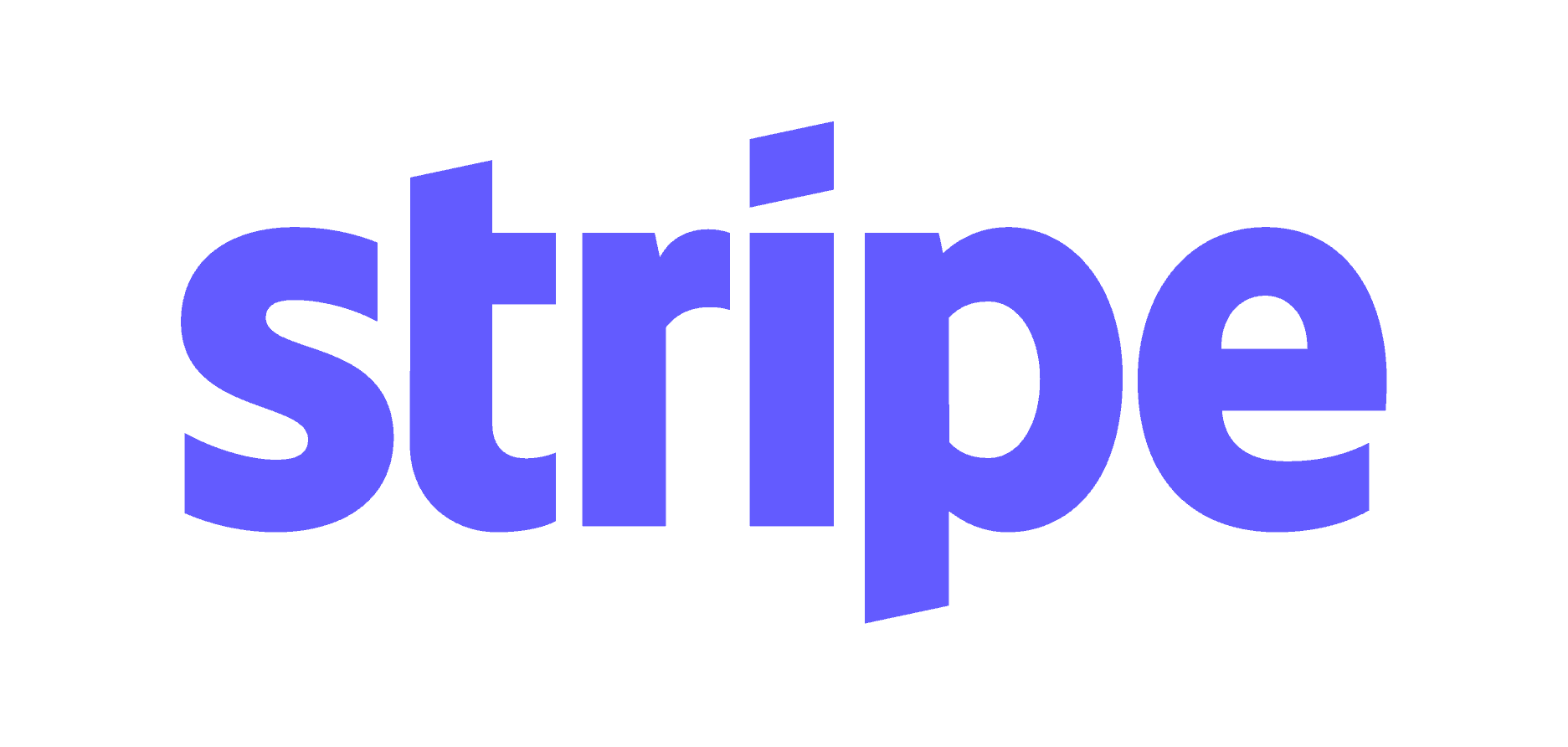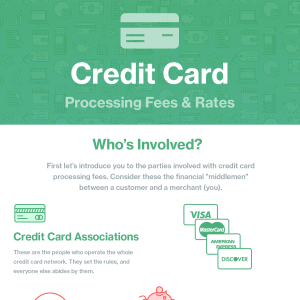Stripe offers custom and volume-based pricing, numerous ancillary services (such as accepting third-party payments with Stripe Connect), and more.
Business owners looking to use Stripe for payment processing may be wondering how much Stripe charges. While Stripe’s flat-rate processing fee initially looks pretty straightforward, there’s actually a surprising amount of complexity to how Stripe fees work, especially when you start to use advanced, premium features.
Below we’ll take a deep dive into Stripe fees and how they may or may not apply to your business.
If you decide Stripe is not the best fit for your particular business, don’t worry; we have a whole other post on the best payment processing options for small businesses.
What Percentage Does Stripe Take Per Sale? Get To Know Stripe Transaction Fees
Stripe charges a flat fee on all basic transactions. Online transactions cost 2.9% + $0.30 (2.2% + $0.30 for nonprofits) each, while card-present transactions all cost a flat 2.7% + $0.05 each. Advanced features may add additional costs per transaction.
There’s no monthly or annual fee for using Stripe.
Is Stripe Free?
Stripe Payments offers a powerful set of payment processing tools and supporting features, which generally do not require a monthly fee. You can sign up for an account for free, and it’s one of the cheapest credit card processing companies that we know of.
However, you’ll still have to pay transaction fees and other use-based fees if you want to do more than have an open account.
What’s Included With Stripe Payment Processing?
The following features are included with a standard Stripe account at no cost:
- Activation
- Developer Tools
- 3D Secure Authentication
- Card account updater
- Stripe Checkout
- Stripe Connect
- PCI Compliance
How Are Stripe Fees Calculated?
Stripe uses flat-fee transaction pricing with add-on charges for advanced features. The price you pay per transaction is based on:
- The total value of the transaction, including taxes and any other applicable charge
- Interchange fees
- Stripe’s base markup
- Fees for international sales
- Optional Stripe features that add fees to the transaction
Note that with Stripe’s flat-rate pricing, you won’t see a breakdown of the interchange and markup fees on your monthly processing statement. This information is only available if you choose a customized pricing plan with interchange-plus pricing.
Take A Closer Look At Stripe Processing & Transaction Fees
Stripe fees are very transparent, so you shouldn’t be caught off guard by what Stripe charges. That said, Stripe’s fee structure can get a little complicated.
Here’s an overview of Stripe’s basic pricing structure under its integrated plan:
| Payment Method |
Rate |
Notes |
| Online Credit Card & Wallet Payments |
2.9% + $0.30 (2.2% + $0.30 for nonprofits) |
Credit/debit cards, Alipay, Apple Pay, Click To Pay, Google Pay, WeChat Pay |
| In-Person Credit Card & Wallet Payments (Stripe Terminal) |
2.7% + $0.05 |
Credit/debit cards |
| International Cards |
+1.5% additional fee |
Available in over 35 countries |
| Currency Conversion |
+1% additional fee |
135+ currencies & payment methods supported |
| ACH Direct Debit |
0.8% per transaction ($5 cap) |
$5.00 maximum fee per transfer |
| Localized Payment Methods |
1.5% + variable transaction fee, +1% for currency conversion |
Includes Bancontact, EPS, giropay, iDEAL, Multibanco, pre-authorized debits in Canada, Przelewy24, SEPA Direct Debit, Sofort |
| Afterpay |
6% + $0.30 |
Pay in 4 installments |
| Klarna |
5.99% + $0.30 |
Pay in 4 installments |
Getting started with Stripe Payments is easy: a Stripe account is free to set up and has no long-term commitment. If you’re using Stripe as part of an integration, such as through Shopify, note that you may have to pay monthly fees associated with that platform.
These fees are not for Stripe specifically, however.
Chargebacks & Refunds
Stripe charges $15 per chargeback. You can add chargeback protection to a transaction for 0.04%.
Refunds do not cost an additional fee, but Stripe will keep the original transaction fee.
Stripe Custom Pricing Plans
In addition to its flat-rate integrated plan, Stripe offers customized pricing to businesses with large payment volumes or unique business models. Unfortunately, it doesn’t provide specific details on the qualifications you would have to meet to qualify under either of these two categories.
With Stripe volume discounts, you’ll receive interchange-plus pricing that will usually be much lower than Stripe’s flat rates. The tradeoff is that you’ll also be subject to the usual assortment of monthly recurring fees, whether you use your account or not. Several items included at no extra charge under the integrated plan will incur separate fees if you’re on a customized plan. Stripe does a pretty good job disclosing these differences on its website, but you’ll want to review your proposed contract thoroughly to avoid being surprised later on.
Stripe Volume Pricing
Stripe doesn’t disclose much information about its high-volume pricing upfront. This typically means plans are built on a case-by-case basis. If you find you’re outgrowing Stripe’s default flat fee pricing structure, you should contact a Stripe representative to see if you can negotiate a custom plan. You should do the same if you’re already running a high-volume business and are considering using Stripe as your payment processor.
Nonprofit Discounts
Stripe’s discounted fees for nonprofits that qualify for the program. You’ll have to show that 80% of your payment volume is in tax-deductible donations, however. Non-eligible items include ticket sales, tuition, membership fees, registration fees, and auction payments.
Micropayments & Alternative Rate Plans
If your business model accepts microtransactions, we recommend contacting sales and asking for a quote and the availability in your market. Stripe suggests that if a microtransaction rate isn’t available in your market, a workaround is to batch together multiple transactions from the same customer into a single, larger charge.
Stripe Connect Fees & Pricing
Stripe Connect is an integration built for marketplaces or platforms that allow third-party payment acceptance. You’ll have three options for your business — Stripe Connect for Standard, Express, and Custom accounts.
Here’s an overview of the main features — and the fees charged for them — of these three options:
|
Standard |
Express |
Custom |
| Account Creation & Maintenance |
No fee |
$2/active user/month |
$2/active user/month |
| Transaction Rates |
No additional fee |
0.25% + $0.25/payout |
0.25% + $0.25/payout |
| Set Custom Transaction Rates |
|
|
|
| Collect Additional Fees On Transactions |
|
|
|
| 1099-K Reporting |
No fee |
$2.99/1099 e-filed or mailed |
$2.99/1099 e-filed or mailed |
| Send Payouts To Users’ Bank Account Or Card |
No fee |
$0.25/payout |
$0.25/payout |
| Send Instant Payout To Your Bank Account Or Card |
1% of payout volume |
1% of payout volume |
1% of payout volume |
For more details about each of these plans and their features, refer to Stripe’s website for the latest information.
Other Stripe Merchant Fees
Stripe has some other products that might be a good fit now or in the future for your small business. We’re going to look at how much these products cost, along with the specific fees Stripe charges for each option.
Stripe International Fees
Another great thing about Stripe is that you can accept international cards (+1.5%). If you need to convert the currency, however, you’ll have to pay +1% on top of that. This is great for businesses that sell internationally, especially with Stripe’s ability to present prices in the customer’s local currency.
While this may seem expensive, it’s much more affordable than many competitors.
Stripe Invoicing & Billing Fees
The Stripe Invoicing and Billing integrations are for businesses focused on recurring revenue growth. Both Stripe Billing and Stripe Invoicing offer a choice of basic and more advanced plans.
Stripe Billing
|
Pay As You Go |
Pay Monthly |
| Cost per recurring charge |
0.7% of billing volume |
Up to $100K billing volume per month (0.67% for additional volume) |
| Automatic bill collection features |
|
|
| Customer portal for user-managed subscriptions |
|
|
| Stripe Connector for NetSuite |
|
|
| Estimates for customers |
|
|
If you opt to pay monthly, pricing starts at $620+/month (1 year contract).
If you want to use your own domain for the customer portal, Stripe charges $10/month.
Stripe Invoicing
|
Starter Plan |
Plus Plan |
| Cost per invoice |
0.4% per transaction |
0.5% |
| Hosted invoice page |
|
|
| Insight and analytics via Stripe Dashboard |
|
|
| Automated payment collection features |
|
|
| Auto-reconciliation for ACH and wire transfers |
|
|
| Estimates for customers |
|
|
Stripe Instant Payouts (For Merchants)
Stripe Instant Payouts allows you to skip the usual one to two business days of waiting for your funds by transferring them to an eligible debit card. You’ll pay a fee of 1.5% ($0.50 minimum) of the transferred amount. Daily transfer limits may apply, depending on your industry and your history with Stripe. Instant payouts are available in the US, UK, Canada, and Singapore.
For Canadian merchants, if Stripe isn’t the right fit for your business, there are other options for Canadian merchant services.
Stripe Terminal Hardware Costs
Stripe’s primary focus is eCommerce, but it also offers support for in-person transactions through Stripe Terminal.
If you need processing hardware, Stripe offers the following choices for sale, all of which are certified to work with Stripe and include cloud-based hardware management:
| Model |
Cost |
| Stripe Reader M2 |
$59 |
| Stripe Reader S700 |
$349 |
| BBPOS WisePOS E |
$249 |
Additionally, Stripe Terminal supports the following readers:
- BBPOS Chipper 2X BT
- BBPOS WisePad 3
- Verifone P400
Tap To Pay
Want to accept mobile payments but don’t want to buy a reader? Stripe Terminal also supports Tap to Pay on both iPhone and Android. This feature uses a smartphone’s built-in NFC capacity to accept payments from NFC-enabled credit and debit cards.
This feature costs the standard in-person transaction fees +$0.10 per authorization.
Stripe Pricing & Costs For Other Services
While Stripe is primarily a platform for accepting and processing payments, it also offers a number of ancillary services that can enhance the security of your account and help safeguard against chargebacks and fraudulent transactions. Here’s a brief overview of Stripe’s pricing for these additional services and what they do:
Stripe Radar
Stripe Radar uses advanced machine learning to screen your transactions for possible fraud. There is no fee for this service if you’re on an integrated plan, but users with customized pricing will pay $0.05 per screened transaction. Radar For Fraud Teams, an advanced service that allows more granular control over how your transactions are screened, is available for $0.02 per transaction under the integrated plan or $0.07 per transaction under customized pricing.
Stripe Atlas
Stripe Atlas helps you form a legal entity with an Employer Identification Number (EIN) and set up a company as a C-Corporation in the state of Delaware if you’re based in another country. Stripe Atlas costs $500 for the initial setup fee and $100/year annually after that. Corporate tax prep packages start at $250/year, and Delaware tax filing starts at $225.
Stripe Identity
Stripe Identity can be used to verify your customers’ identity and includes ID document verification and ID number lookup features. It costs $1.50 per verification and $0.50 per ID lookup, regardless of which type of pricing plan you’re using. Note that the ID number lookup feature is currently limited to checking US social security numbers.
Stripe Issuing
Stripe Issuing allows merchants to create branded physical and virtual credit and debit cards. Cards can then be issued through Stripe Connect.
| Stripe Issuing |
Cost |
| Card creation, virtual |
$0.10 per card |
| Card creation, physical |
$3.50 per card |
| Disputes |
$15 per dispute |
| International payments |
1% + $0.30 for cross-border transactions, 1% for currency conversion |
Stripe Treasury
Stripe describes its new Treasury feature as a “banking-as-a-service API that lets you embed financial services in your marketplace or platform.” Payment processing APIs come with additional advantages in that you can create a custom payment processing setup.
With Stripe Treasury, you can enable your customers to hold funds, pay bills, earn interest, and manage their cash flow. No pricing information is currently disclosed. As you might have guessed, this powerful product is mainly geared toward very large, enterprise-level businesses.
Stripe Tax
An optional feature, Stripe Tax automatically calculates and collects the applicable tax for your customer’s location and produces detailed reports for use when filing your taxes. Stripe Tax costs 0.5% per transaction where you’re registered to collect taxes (0.4% for processing volumes over $100,000/month).
Stripe Capital
Stripe Capital is Stripe’s lending program. Qualified businesses that use Stripe can borrow money in a program that looks somewhat like a merchant cash advance. Borrowers repay the loan by allowing Stripe to collect a percentage of their daily sales until the loan is paid off. Rates vary depending on processing volume and your history with Stripe.
Are Stripe Fees & Pricing The Best Option For Businesses?
Stripe offers very transparent pricing, but you’ll have to run the numbers to determine if Stripe’s payment fees save you money compared to your current processor or another one that you’re comparing. Stripe does not charge monthly fees or lock you into a contract, and payment security is included with processing.
We think businesses wanting a fully-branded, ready-to-scale solution will likely find all the tools they need and then some with Stripe Payments. However, for the eCommerce business that simply needs a reliable and secure payment processor, it may be overkill. If you don’t have the technical expertise or developers on staff, you may never tap into Stripe’s full potential.
For a more in-depth analysis of Stripe’s many products and features, check out our full review of Stripe. And if you don’t think Stripe is right for your business, check out our list of the best Stripe alternatives and best online payment processing providers.












